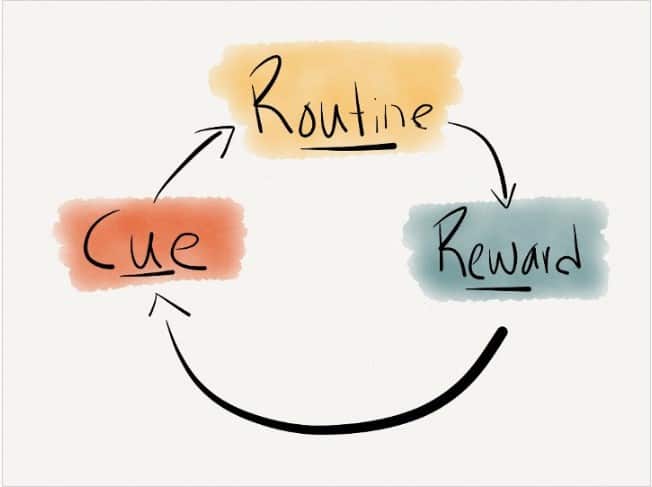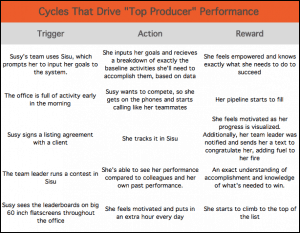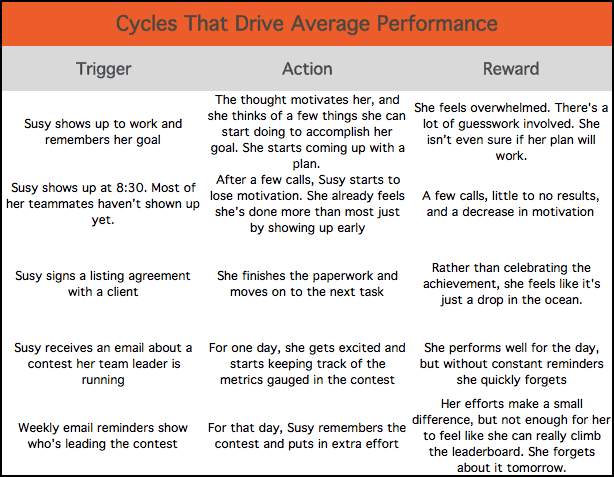Let’s talk about a common mistake I’m seeing in real estate today.
There are two ways to grow your business - recruit more agents to sell more homes, or teach your existing agents to become top producers. Both are critical for any team looking to grow, but sometimes team leaders and brokerages seem more focused on the first.
Training your team (or yourself) to become a top producer is simply a matter of psychology and process.
Overview: Becoming a Top Producing Agent
Imagine an agent (lets call her Susy) has been on a team for a few years. She’s consistently selling one house each month, but has aspirations to become a top producer. She’s desirous to improve her life and achieve her potential, so she sets the goal to sell three houses per month (now we’re talking!)
Susy now has a goal, but let’s look at what it takes to make this goal sustainable—a goal that it lasts longer than the resolutionists at the gym for the first three weeks in January.
45% of our day to day activities are actually habits. This means that, in order for Susy to drive a 3x increase in her business, she needs to create habits.
These habits should increase both her productivity (work ethic) and efficiency (how good is that work).
This illustration (Credit:Tech Chrunch) on habit creation expalins how these habits can be formed.

There are three parts to forming great habits: Cues (or triggers), Routines (or actions), and rewards. I call the three of them together habit cycles. I look for these cycles in every real estate brokerage, team, or agent that I observe. They tell an important part of the story.
Cycles make a HUGE difference because they form habits.
Take a look at how a few different groups of triggers, actions, and rewards help Susy either achieve or forget her goal:


Any one of these cycles alone won’t be enough to turn an average agent into a top producer, but a combination of all of them becomes very powerful. It’s this combination that makes the difference between top producers and average agents.
Leaders: you have the ability to create triggers, influence actions, and offer motivating rewards. That’s how you assist your team in becoming top producers.
Setting Growth Triggers
Triggers, or cues, are what inspire actions, good or bad. They start the whole process. So, it makes sense to say that the more positive triggers you set up in your work environment, the more motivated you (and your team) will be. They can be big or small, but the important thing is that you have a lot of them.
Examples:
- The flat screen TV with performance metrics in the example above
- Messages to congratulate agents on achievements
- Anything, anything at all that reminds an agent of their goals
- Contests or challenges
- Interaction with other agents
- A coaching session (doesn’t have to be long but at least weekly to give outside accountability)
The list goes on, and there’s a lot of room for creativity here.
As an agent growing your personal business, you can set up your own triggers that you know will motivate you.
Leaders should understand that every agent is different and the more growth triggers you set up for your team, the more inspired they’ll be to act.
How Teams Can Contribute to the Growth Environment
The greatest leaders inspire those around them to do more and live better lives. This is simply the psychology of doing that.
The triggers that you set on your team create actions, but you still have some work to do to make sure that those actions are effective.
For example, a team competition will motivate agents, but what do you want to motivate them to do? You can influence this by clearly defining which sales activities will earn the most points. Points only matter if you are keeping score, so keep score with leaderboards!
If you motivate agents to sell more houses in general, you’ll need to also provide them with metrics that will help them know what specifically they can do to become more effective. Get what I’m saying?
A huge part of this is being able to take your team’s (or an individual agent’s) historical data and find opportunities for improvement. The numbers tell a story so know your numbers, track your activities, and with it you can optimize your sales processes.
Celebration (Rewards) Make it a Cycle
Gary Vaynerchuk, in one of his recent podcasts, said
“My little man, Zander, will not score a basket on me until he’s 15.”
He agrees that it’s important to build confidence, but says
“Confidence should not come through fake marketplace dynamics… but, for example if (Zander) opens the door for an old lady when he’s 6, I’ll make it seem like he won the world series.”
This is a great example of how achievement should be rewarded. Noprizes for “almost” hitting the goal but, when your team or yourself follows through on an objective, celebrate like crazy!
I’m not only talking about contests here. Celebration is a key to happiness in everything. Think again about the charts above, when Suzy closed a listing agreement: The first she celebrated, the second she ignored. The first example accentuates the cycle, the second stops it in its tracks.
In fact, achievement gives your brain a boost of an addictive, feel-good substance we all love - dopamine. When you achieve something and take the time to celebrate, you increase the time and exposure of that dopamine - strengthening your resolve to continue doing whatever helped you achieve in the first place.
Celebration is the final step that turns top producer activities into habits. It’s absolutely essential. Look for ways you can celebrate success - in your own life, with your agents, on your team - and you’ll see massive results. I can’t stress this enough.
Consult With Us
We’re experts in creating this type of addictive, fun, and rewarding sales environment. That’s exactly what Sisu’s products and platform are built for. We’d love to offer you a free demo.








.png)


